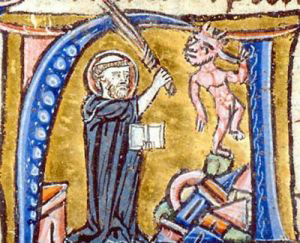Reflections on P. Leo XIII and Assent Due to Infallible Teachings of the Magisterium
Yet another beautiful excerpt from P. Leo XIII on the assent owed to teachings which are considered to be divinely revealed (see 1st paragraph teachings of the 1998 Professio Fidei). Also how the Church's Magisterium is the only authority which can determine what articles of faith have been divinely revealed. Private individuals, whether educated or not, don't have this authority.
He also gives wisdom from St. Thomas Aquinas as to why an infallible authority is necessary for any ecclesiastical body whatever.
I have given the entire paragraph in its entirety; however, I did insert spaces between statements to make reading easier. Enjoy!
SAPIENTIAE CHRISTIANAE
ENCYCLICAL OF POPE LEO XIII
ON CHRISTIANS AS CITIZENS
Paragraph 22. Now, as the Apostle Paul urges, this unanimity ought to be perfect. Christian faith reposes not on human but on divine authority, for what God has revealed "we believe not on account of the intrinsic evidence of the truth perceived by the natural light of our reason, but on account of the authority of God revealing, who cannot be deceived nor Himself deceive."
It follows as a consequence that whatever things are manifestly revealed by God we must receive with a similar and equal assent. To refuse to believe any one of them is equivalent to rejecting them all, for those at once destroy the very groundwork of faith who deny that God has spoken to men, or who bring into doubt His infinite truth and wisdom.
To determine, however, which are the doctrines divinely revealed belongs to the teaching Church, to whom God has entrusted the safekeeping and interpretation of His utterances. But the supreme teacher in the Church is the Roman Pontiff.
Union of minds, therefore, requires, together with a perfect accord in the one faith, complete submission and obedience of will to the Church and to the Roman Pontiff, as to God Himself.
This obedience should, however, be perfect, because it is enjoined by faith itself, and has this in common with faith, that it cannot be given in shreds; nay, were it not absolute and perfect in every particular, it might wear the name of obedience, but its essence would disappear.
Christian usage attaches such value to this perfection of obedience that it has been, and will ever be, accounted the distinguishing mark by which we are able to recognize Catholics.
Admirably does the following passage from St. Thomas Aquinas set before us the right view: "The formal object of faith is primary truth, as it is shown forth in the holy Scriptures, and in the teaching of the Church, which proceeds from the fountainhead of truth. It follows, therefore, that he who does not adhere, as to an infallible divine rule, to the teaching of the Church, which proceeds from the primary truth manifested in the holy Scriptures, possesses not the habit of faith; but matters of faith he holds otherwise than true faith.
Now, it is evident that he who clings to the doctrines of the Church as to an infallible rule yields his assent to everything the Church teaches; but otherwise, if with reference to what the Church teaches he holds what he likes but does not hold what he does not like, he adheres not to the teaching of the Church as to an infallible rule, but to his own will."
Sources:


Comments
Post a Comment